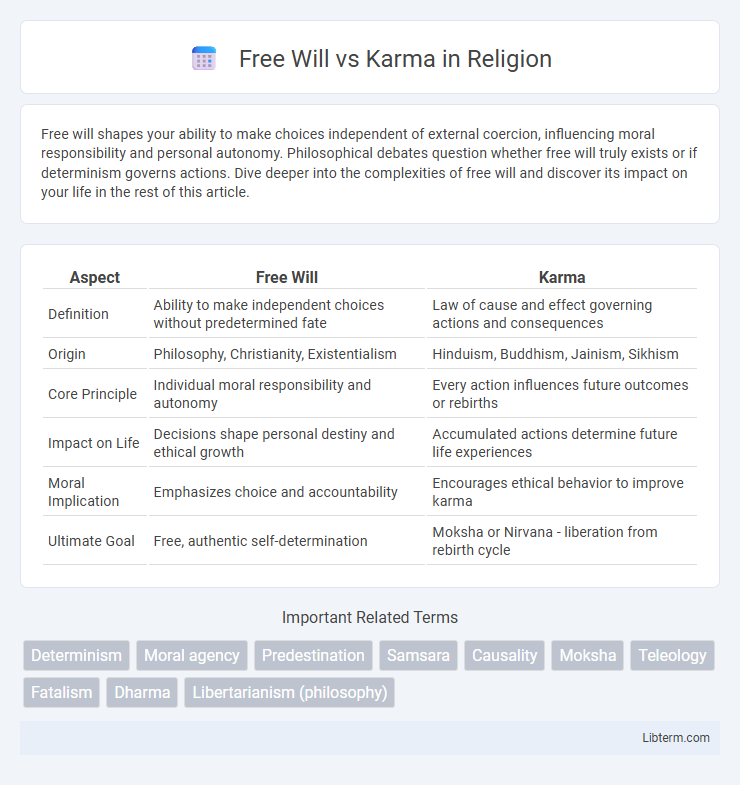Free will shapes your ability to make choices independent of external coercion, influencing moral responsibility and personal autonomy. Philosophical debates question whether free will truly exists or if determinism governs actions. Dive deeper into the complexities of free will and discover its impact on your life in the rest of this article.
Table of Comparison
| Aspect | Free Will | Karma |
|---|---|---|
| Definition | Ability to make independent choices without predetermined fate | Law of cause and effect governing actions and consequences |
| Origin | Philosophy, Christianity, Existentialism | Hinduism, Buddhism, Jainism, Sikhism |
| Core Principle | Individual moral responsibility and autonomy | Every action influences future outcomes or rebirths |
| Impact on Life | Decisions shape personal destiny and ethical growth | Accumulated actions determine future life experiences |
| Moral Implication | Emphasizes choice and accountability | Encourages ethical behavior to improve karma |
| Ultimate Goal | Free, authentic self-determination | Moksha or Nirvana - liberation from rebirth cycle |
Understanding Free Will: Definition and Concepts
Free will refers to the capacity of individuals to make choices unconstrained by external forces or predetermined fate, emphasizing autonomy and personal agency. This concept encompasses various philosophical interpretations, including libertarianism, which argues for genuine freedom of choice, and compatibilism, which reconciles free will with determinism. Understanding free will involves analyzing the extent to which humans can influence their actions independently of causal chains or karmic consequences.
Karma Explained: Origins and Interpretations
Karma, originating from ancient Indian religions such as Hinduism, Buddhism, and Jainism, refers to the principle of cause and effect where an individual's actions directly influence their future experiences. Interpretations of karma emphasize moral causation, where good deeds generate positive outcomes while harmful actions lead to negative consequences, impacting one's current life and future rebirths. This concept contrasts with free will by suggesting that choices are influenced by past deeds, intertwining destiny and personal responsibility within a cycle of samsara.
Historical Perspectives on Free Will and Karma
Ancient Indian philosophies articulate karma as a law of moral causation, where individual actions influence future experiences, suggesting a deterministic universe moderated by ethical conduct. In contrast, Western thought, particularly through Augustine and Aquinas, emphasizes free will as a divine gift enabling moral responsibility and choices independent of predestined fate. Historical debates reveal a complex interplay where free will challenges deterministic interpretations of karma, underscoring divergent views on human agency and moral accountability across cultures.
Philosophical Debates: Free Will vs Karma
Philosophical debates on free will versus karma center on whether individuals possess autonomous choice or are bound by predetermined cosmic consequences. Free will emphasizes human agency in shaping moral decisions, while karma suggests actions inherently determine future outcomes through a causal moral law. This discourse explores the tension between individual responsibility and the inevitability of karmic justice across various philosophical and religious traditions.
Eastern vs Western Views on Destiny
Eastern philosophies often emphasize karma as a cosmic law governing destiny, where actions in past lives directly shape one's future experiences, suggesting a deterministic framework with limited individual free will. Western perspectives tend to highlight free will, promoting the idea that individuals possess the autonomy to shape their own destinies through choices and personal responsibility. The contrast lies in Eastern views integrating destiny and morality through karmic cause and effect, while Western views prioritize conscious decision-making and ethical agency.
The Role of Choice in Shaping Outcomes
The role of choice in shaping outcomes highlights the dynamic interplay between free will and karma, where individual decisions influence future experiences while karmic laws govern consequences. Personal choices act as catalysts that can alter pre-existing karmic patterns, emphasizing empowerment within spiritual accountability frameworks. Understanding this interaction underscores the significance of conscious decision-making in transforming life trajectories according to both autonomous intent and karmic causality.
How Karma Influences Personal Responsibility
Karma shapes personal responsibility by linking actions to their consequences, emphasizing accountability for choices made. This principle encourages conscious decision-making, as individuals understand their current circumstances result from past behaviors. Recognizing karmic influence promotes ethical living, reinforcing the idea that free will operates within the framework of cause and effect.
Scientific Insights: Are Our Actions Predetermined?
Scientific insights into free will versus karma explore whether human actions are predetermined by genetic, neurological, and environmental factors or if conscious choice truly exists. Neuroscientific studies reveal brain activity predicting decisions before conscious awareness, suggesting predetermined neural processes influence behavior. However, the complexity of quantum mechanics and emergent properties in neural networks imply a probabilistic model where free will may operate within constraints rather than being entirely predetermined.
Free Will and Karma in Modern Society
Free will enables individuals in modern society to make conscious choices that shape their personal and social realities, emphasizing responsibility and moral agency. Karma functions as a conceptual framework suggesting that actions have consequences that influence future experiences, reinforcing ethical behavior and accountability. Together, free will and karma interact to guide decision-making processes and promote a balanced understanding of cause and effect in contemporary life.
Integrating Free Will and Karma: A Balanced Approach
Integrating free will and karma involves recognizing individual choices as catalysts that influence karmic outcomes, allowing personal responsibility to shape future experiences. This balanced approach emphasizes conscious decision-making within the framework of karmic law, where actions generate consequences aligned with ethical principles. By harmonizing free will with karma, individuals empower themselves to create positive change while respecting universal cause-and-effect dynamics.
Free Will Infographic

 libterm.com
libterm.com